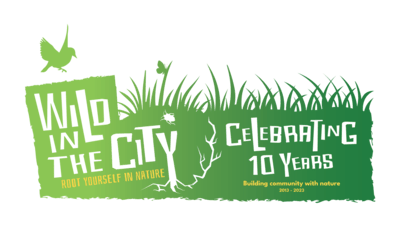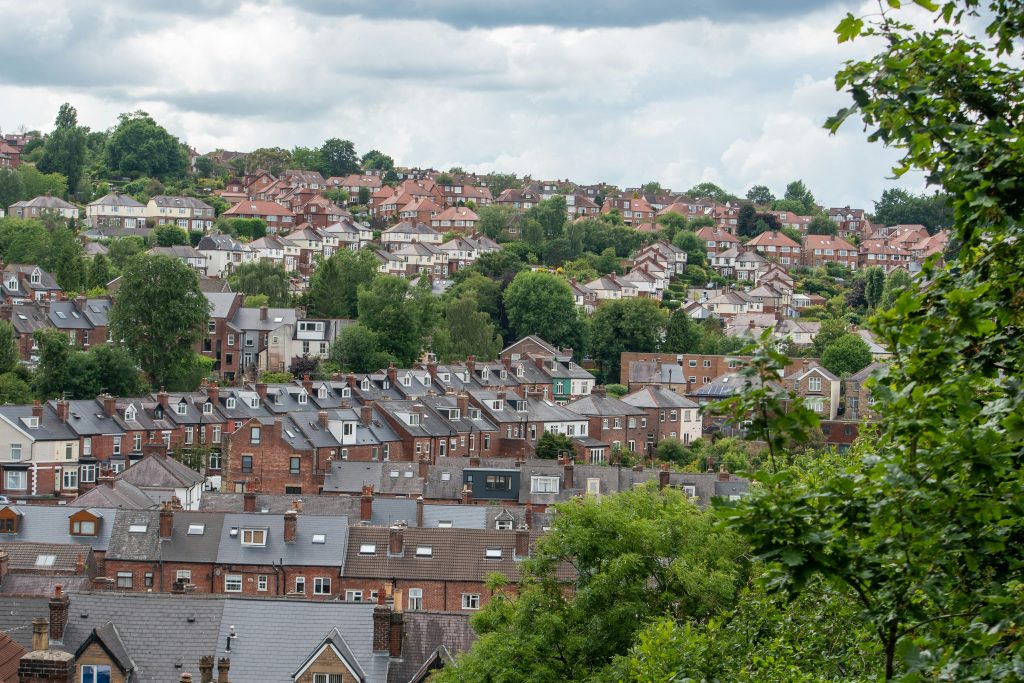
Media
Watch, listen and read about our work supporting people in developing their relationship with nature, the experiences of people of colour in finding space to connect, and the value of nature to health and well-being.
Press Release – Air pollution to be given consideration when investigating cause of illness (12/03/24)
 Wild in the City is pleased to hear that air pollution will be given consideration in the diagnosis of children presenting at Great Ormand Street Hospital. In collaboration with Imperial College London, air pollution levels for patient’s postcodes are now easily accessible and added to their medical records. We congratulate Rosamund Adoo-Kissi-Debrah on her efforts to bring change following the death of her daughter Ella Adoo-Kissi-Debrah in 2013 due to an asthma attack which was triggered by air pollution.
Wild in the City is pleased to hear that air pollution will be given consideration in the diagnosis of children presenting at Great Ormand Street Hospital. In collaboration with Imperial College London, air pollution levels for patient’s postcodes are now easily accessible and added to their medical records. We congratulate Rosamund Adoo-Kissi-Debrah on her efforts to bring change following the death of her daughter Ella Adoo-Kissi-Debrah in 2013 due to an asthma attack which was triggered by air pollution.
Great Ormand Street have added data to patients’ electronic records to provide information on fine particular matter (PM2.5) and nitrogen dioxide, and indicate if they exceed World Health Organisation safe levels. The record will also have links to further information and training to help clinicians consider whether air pollution is a factor in their child’s illness, how it affects them, and if there are steps to be taken to help.
In 2020, Ella became the first person in the UK to have air pollution listed as a cause of death on her death certification. The coroner, Philip Barlow, noted that Ella’s mother, Rosamund, “was not given information about the health risks of air pollution and its potential to exacerbate asthma.” Rosamund told the inquest that “moving would have been the first thing to do” if she had been told that her daughter was being harmed by the air she was breathing. She further stated, “There seems to be a disconnect between medical and public health, so public health has all the information and medics don’t. They need to work together much more closely.” In his ‘Prevention of Future Deaths’ report, Barlow called on medical staff to do more to inform families about the dangers of air pollution.
UCL estimate that air pollution is responsible for the premature death of 48,625 adults in the UK each year, with 79% of the UK exceeding the World Health Organization’s guideline for safe fine particular matter levels.i The World Health Organization’s Air Quality guidelines can be read here.
Toxic air is frequently over permissible limits.ii People of colour are disproportionately affected by toxic air. People of colour are more likely to live in areas with high air pollution levels and levels over the legal limit.iii People of colour are also less likely to live close to trees and greenspaces which reduce air pollution and have positive benefits for health.iv
In addition to asthma, air pollution is linked to many forms of ill health including respiratory and cardiovascular diseases, stroke, dementia, cancer, fertility problems and foetal development. A 2023 report from Imperial University states that “Children living in London are particularly at risk of developing lifelong, chronic conditions, including poorly developed lungs, asthma, high blood pressure, inattention and hyperactivity, and mental illness.”v
Key concerns
- UK cities frequently breach legal limits for toxic air
- Air pollution causes harm to health at all stages of life
- More ethnically diverse neighbourhoods have higher levels of air pollution
- People of colour are disproportionately affected by air pollution
Beth Collier, Director of Wild in the City, said, “People of colour are disproportionately disadvantaged by many city stressors, including air and noise pollution and live in less proximity to the positive health benefits of nature that could mitigate the harm. Acknowledging the health impacts of environmental issues beyond our individual personal control is a big step towards understanding environmental stressors as a public health issue, air pollution makes us unwell and can kill.
The government should do more to initiate action to eradicate toxic air. It shouldn’t be up to the tireless work of campaigners such as Rosamund Adoo-Kissi-Debrah to ‘fight’ for change when the research so clearly tells us that air pollution harms us all, and that some of us are more exposed than others. As Adoo-Kissi-Debrah says, it is a “public health emergency.” We need to challenge a social acceptance of air pollution as a necessary consequence of modernity. It is not benign; it is harming our health. We need to shift expectations for change to be immediate. The medical profession normalising air pollution as a cause of ill health is an important part of recognising the harm.”
About Wild in the City’s work and the impact of air pollution
Wild in the City works to support the well-being of people of colour, through relationship with nature. We create a secure base for nurturing a deeper relationship with nature and help people of colour find their place in UK countryside, recognising the trauma of disenfranchisement from nature[vi] and the health consequences of not spending time in nature.vii
Over 98% of people of colour live in cities and have less proximity to nature and the health benefits, whilst living in closer proximity to city stressors which harm our health. Trees and greenspaces decrease the levels of small particulate matter and improve air quality, so it is vital that people have greenspaces close by. People of colour have less access to nature close to their homes, 40% of Black And Minority Ethnic (BAME) people live in the most green space-deprived areas, compared to 14% of white people, and only 39% of BAME people live within a five-minute walk from green space, compared to 57% of British adults. For more information about Wild in the City, visit wildinthecity.org.uk or email sylvia@wildinthecity.org.uk.
References
i https://www.ucl.ac.uk/news/2023/oct/uk-air-pollution-regulations-will-reduce-deaths-do-little-protect-ecosystems
ii https://data.london.gov.uk/dataset/air-quality-monitoring-diffusion-tube-results
iii https://www.imperial.ac.uk/news/163408/ethnic-minorities-deprived-communities-hardest-pollution/
iv https://www.runnymedetrust.org/blog/the-race-factor-in-access-to-green-space
v https://www.imperial.ac.uk/news/244355/review-highlights-lifelong-health-impacts-pollution/
vi https://theecologist.org/2019/oct/10/black-absence-green-spaces vii https://www.runnymedetrust.org/blog/the-race-factor-in-access-to-green-space
WitC responds to APPG report (13/02/24)
Wild in the City director, Beth Collier, has responded to a report that finds that the British countryside is inaccessible to people of colour.
Speaking on Channel 5 News on Tuesday, 13 February 2024, Beth said attitudes to people of colour being in the countryside hindered many people of colour from experiencing nature for the first time. This was in line with the evidence outlined in the report.
Wildlife and Countryside Link, a coalition of 80 organisations working for the protection of nature, submitted evidence to an All Party Parliamentary Group call for responses on Race and the Environmental Emergency.
Their findings highlighted several structural, experiential and cultural barriers that prevent people of colour from accessing green spaces.
Wild in the City (WitC) has been amongst the first to conduct in-depth ethnographic research into people of colour’s relationship with nature. Our findings have influenced discussion within the environmental sector by introducing Black perspectives on disparities in engagement with nature.
The organisation was founded 10 years ago by Beth Collier, a Nature Allied Psychotherapist and ethnographer, to support people of colour in finding our place in the UK countryside, train people of colour as leaders in nature, and explore the opposition to Black presence in environmental spaces.
Read some of the key research that WitC has produced on PoC access to nature in the UK below:
- Black absence in green spaces by Beth Collier, The Ecologist, October 2019
- Not My Green Space? White Attitudes Towards Black Presence in UK Green Spaces, Springer Link
- The race factor in access to green space, The Runnymede Trust, August 2020
For more information about the Wild in the City or to request an interview with Beth Collier, email info@wildinthecity.org.uk.
Link between tree equity and race revealed in new online tool
For the first time in the UK, the Tree Equity Score shows how disparities between tree canopy cover and race have a real impact on health outcomes
Wild in the City is pleased to have contributed to the creation of an innovative online map which shows, for the first time, disparities in urban tree cover across the UK. Spearheaded by the Woodland Trust and based on a US tool developed by American Forests, the map reveals how less affluent areas, including those with high ethnic minority populations, have fewer trees meaning people living in these areas miss out on their essential health benefits, like cleaner air.
The Tree Equity Score is a free interactive tool that uses new tree canopy data from Google and six climate, health, and socioeconomic indicators to generate a score from 0 to 100 for most urban neighbourhoods in the UK. Find out your neighbourhood’s Tree Equity Score by visiting https://uk.treeequityscore.org/.
Lower tree cover has a dramatic effect on neighbourhoods. Those with the highest number of trees have up to 330% less air pollution and are four degrees Celsius cooler during a heat wave than neighbourhoods where tree canopy is lowest. Trees improve air quality by removing particulate air pollutants, as well as cool city streets by providing natural shade. Research from the UK Environment Agency shows air pollution is the single biggest environmental threat to health in the UK, shortening tens of thousands of lives each year, and heat-related deaths are increasing annually.
Some of the key findings from the research reveal troubling disparities:
- Neighbourhoods with the fewest people identifying as being from minority ethnic groups have roughly double the tree canopy per person than neighbourhoods with the most, and experience 50% less toxic pollutant nitrogen dioxide (NO2) air pollution, 20% less particulate matter (PM2.5) air pollution and are five degrees Celsius cooler.
- Neighbourhoods with the highest income levels have more than double the tree cover per person than less affluent neighbourhoods, and they have nearly 20% less of the toxic pollutant, NO2.
- In England, regional differences are present, with the 10 local authorities with the highest scores in the south and the 10 with the lowest scores in the north.
Beth Collier, Director of Wild in the City, said, “The Tree Equity Score is a great innovation, highlighting the disadvantages in not having trees near to your home and will be a means to achieving health parity for communities with less access to trees and the benefits they bring.
Our proximity to trees is an issue of environmental justice. People of colour are more likely to live in areas of deficiency of access to nature, whilst experiencing higher levels of city stressors such as air and noise pollution, and urban heat island affect. Less tree canopy cover has been shown to correlate with higher levels of anti-social behaviour; those areas with most trees have been shown to be linked to higher levels of education and life expectancy.
We hope that authorities with tree planting responsibilities use the tool to consider where they are planting and who will benefit from the canopy, taking steps towards health and other parities.
We hope that the Tree Equity Score will inspire a greater sense of ownership by communities in the importance of planting trees. This tool will help us recognise the loss of trees, which may have become normalised. We all deserve to see green from our window or have it a few steps from our home.”
About Wild in the City’s work with the Woodland Trust
Wild in the City is working with the Woodland Trust to investigate the relationship between tree canopy cover and ethnicity. Whilst it is well documented that, in the UK, people of colour have less access to nature close to their homes – a higher percentage of people of colour live in urban areas (98.2% of Black people)ii, 40% of Black And Minority Ethnic (BAME) people live in the most green space deprived areas, compared to 14% of white people, and only 39% of BAME people live within a five-minute walk from green space, compared to 57% of British adults – there has been little research about the relationship between tree canopy cover and ethnicity in the UK, compared to US, where the practice of redlining has led to a 38% lower level of tree canopy cover in Black communities.
For more information about Wild in the City, visit wildinthecity.org.uk or email sylvia@wildinthecity.org.uk.
WitC featured in Positive News magazine
Here’s a snippet from the article, published in November 2023, which you can read in full by clicking on the image below:
The team at Forestry England hope the new trails will encourage more people into forests. It particularly wants to attract visits from people of colour and those from diverse socioeconomic backgrounds as research shows they have vastly reduced access to green spaces. Data from the Campaign to Protect Rural England found that just 1% of visitors to national parks in England were from Black, Asian, or Ethnic (BAME) minority backgrounds, in contrast to 14% of the population in England who are BAME.
“When we first started, our presence was seen as troublesome,” says Beth Collier, a psychotherapist and founder of Wild in the City, a group that helps people of colour reconnect with nature. “It raised awareness of the fact that the sector was very white. It raised questions about the environmental sector, particularly around a fear of hostility or racism.”
Statement on systemic and pervasive racism in the environmental field
25 June 2020
An international collective of Black environmental leaders from US, Africa and UK, including Beth Collier – Director of Wild in the City, have published a statement demanding an end to systemic and pervasive racism in the environmental field. Read here
Watch
BBC, Cities; Nature’s New Wild

Wild in the City’s Director, Beth Collier, was featured in the recent BBC series ‘Cities: Nature’s New Wild’. Narrated by Daniel Kaluuya, this three part series explores how wildlife has responded to the spread of human habitats throughout the world, with episodes on Residents, Commuters and Outcasts.
The last 10 minutes of Episode 3, Outcasts, features a section on London becoming a National Park City and the importance of nature to urban resident’s well-being. As well as featuring Beth talking about the importance of a relationship with nature, the script for this section uses her research on the value of nature to human health.
Watch on iplayer
ITV, Lorraine, March for your Mind
We spoke with Lisa Faulkner in one of Croydon’s beautiful valleys to talk about the benefit of hiking for our emotional health, as part of ITV Lorraine’s March for your Mind campaign. Watch the full item here: https://bit.ly/399fIk8
BBC London, Can farm animals improve your mental health?
In this short film, on location at Crystal Palace Park Farm, Beth Collier helps make the case for nature and city farms in supporting our emotional health.
Wild in the City Festival 2019
The Outdoor Office™
The UK in 100 Seconds, film premiere
Watch Beth speaking on the panel discussion ‘Making more room for nature’ at the premier of film ‘UK in 100 Seconds’, narrated by Benjamin Zephaniah, featuring Dan Raven Ellison and filmed by Jack Smith.
Listen
Over the Bridge, podcast, S3-E3
Listen to Over The Bridge @otbpodcastuk podcast ‘Reconnecting with Nature’, with guest Beth Collier; discussing our relationship with nature as black & mixed race people, London becoming a National Park City and more. The conversation is chaired by OTB presenter and WitC trainee Nature Guide, Kwaku.
Colourful Radio

Listen to Beth in discussion with Colourful Radio presenter Jacqueline Malcolm, talking nature, identity and well-being. (October 2017)
Read
Happiful, What is Friluftsliv?
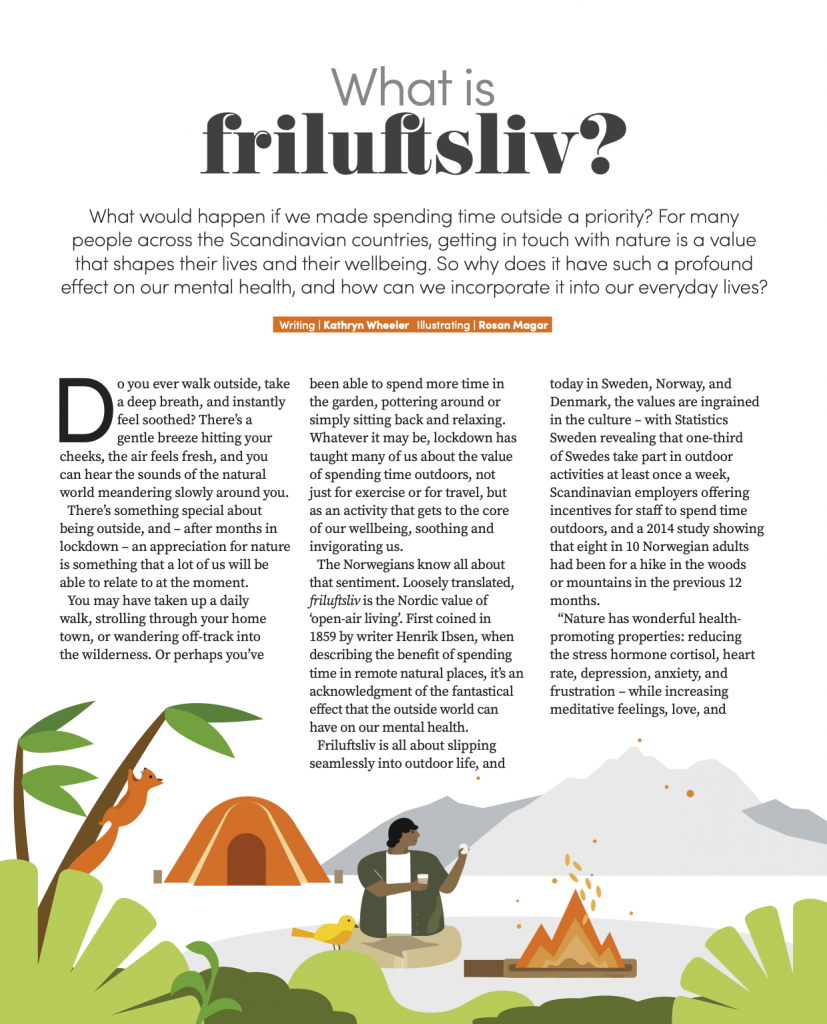
Happiful’s Kathryn Wheeler talks to Beth about Friluftsliv, the benefits of connecting with natural places. Read the full article here.
Croydon’s Wild in the City changing the face of outdoor leadership
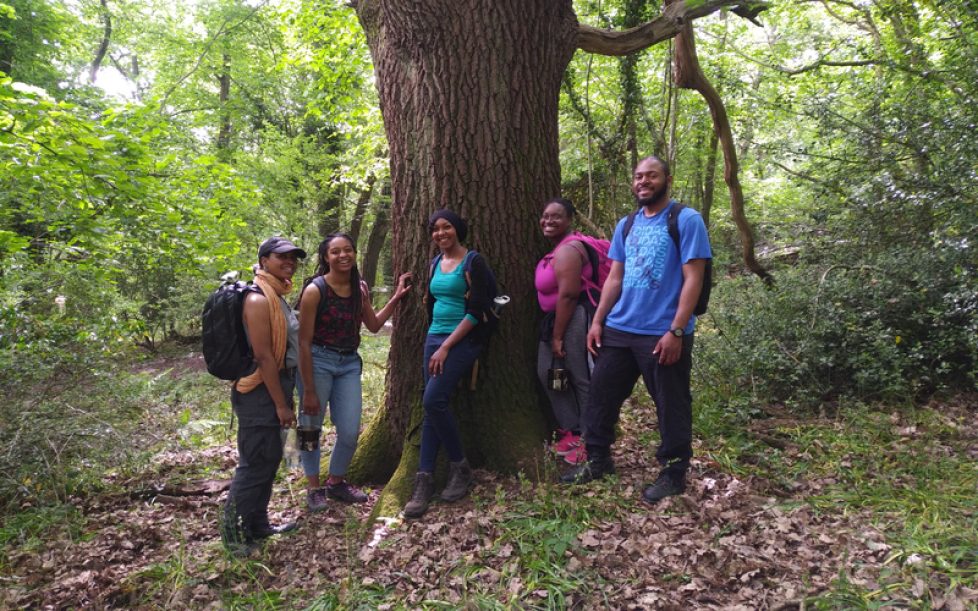
In this South West Londoner article, Beths talks about Wild in the City and the great work it does. Read the full article here.
Black Absence in Green Spaces
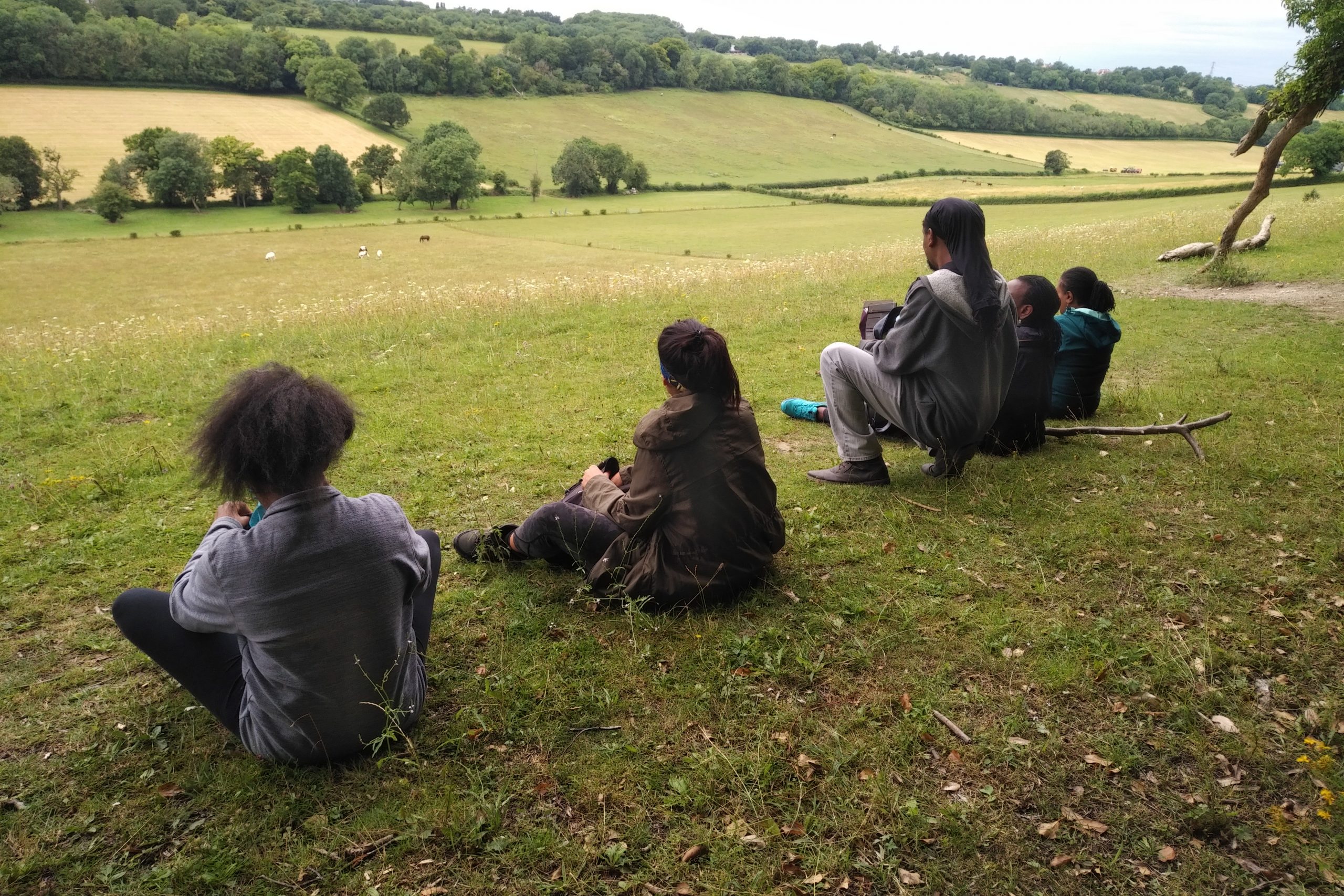
People of colour in the west spend significantly less time in nature, an absence rooted in traumas of racism and loss. In this article for The Ecologist, Beth summarises her ethnographic research exploring people of colour’s relationship with nature in the UK. Read the full article here.
The race factor in access to green space

In this article for Runnymede Trust’s Race Matters, Beth explores nature-related health disparities for black and minority ethnic people in a time of lockdown. Read the full article here.
Nature Connectors; People of colour in nature
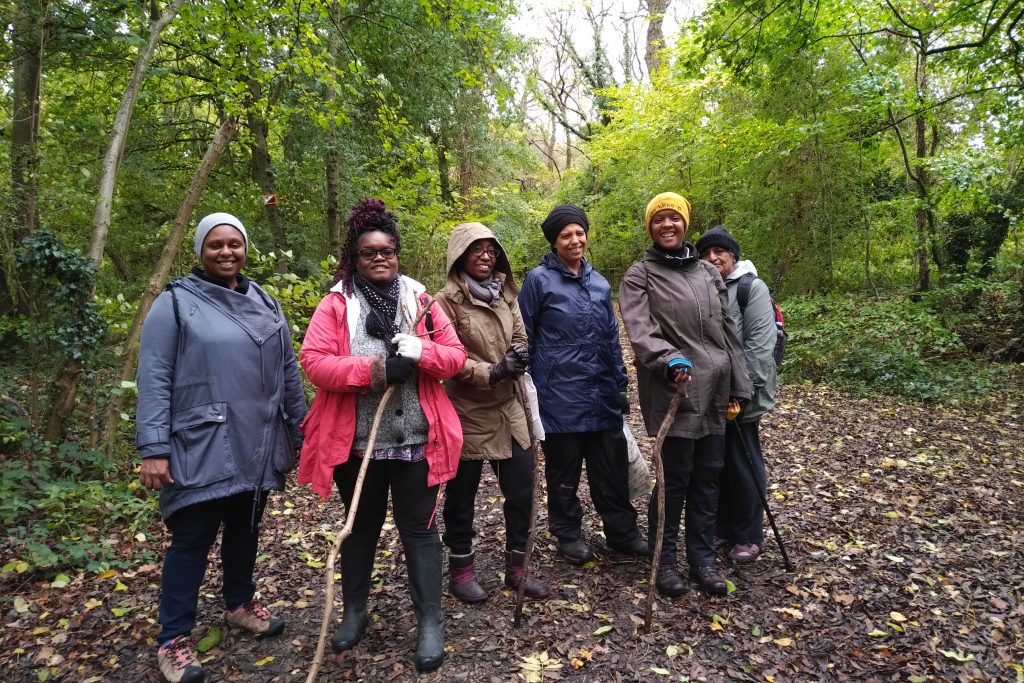
View a multi-media piece documenting our Nature Connector’s course, building bridges back into nature and the oral tradition. See the full piece here.
“Nature Connectors are guiding people in exploring beautiful natural settings in and around London.
Helping Londoners nurture a closer relationship with the natural world and with others: learning woodland living skills, wildlife identification and traditional crafts.”
Metro, Meet the group helping black people reconnect with the natural world
The Metro’s Natalie Morris, wrote a great profile piece about our work creating spaces for people of colour to enjoy nature.
Read the full article here.
Culture of Confinement is a Child Rights Issue
This post first appeared in the London National Park City blog, read the full article here.
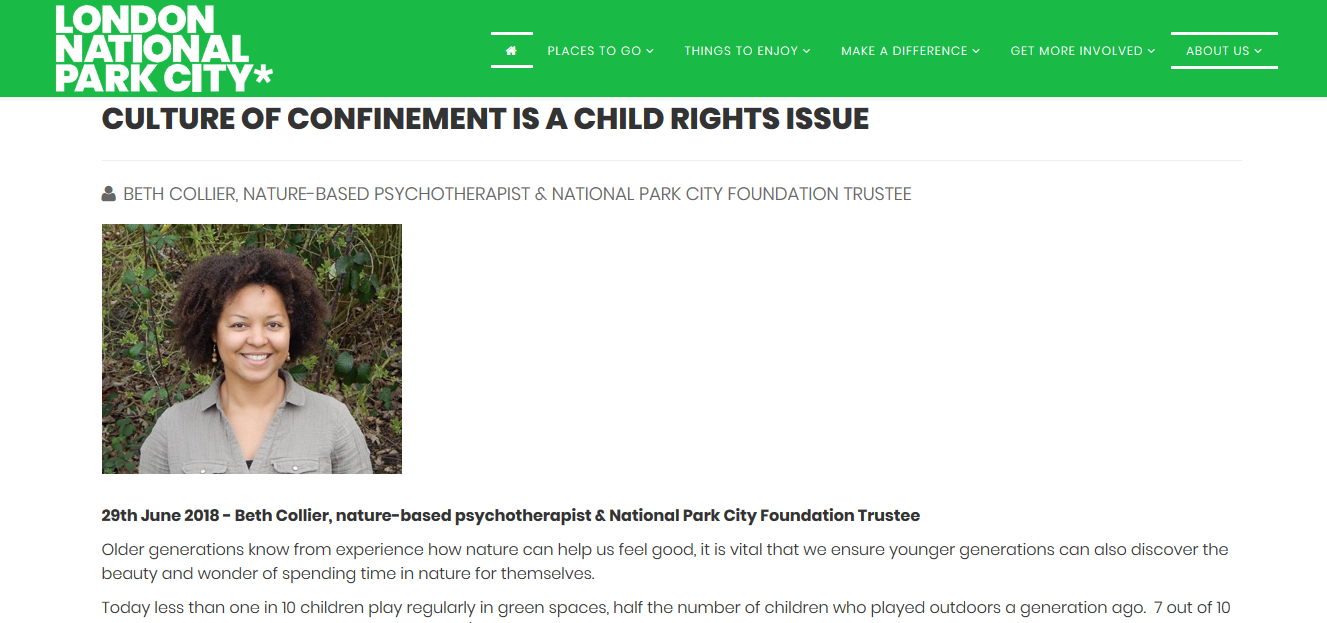
The Voice, The Great Outdoors, Beth Collier
This article first appeared in The Voice, read the full text here
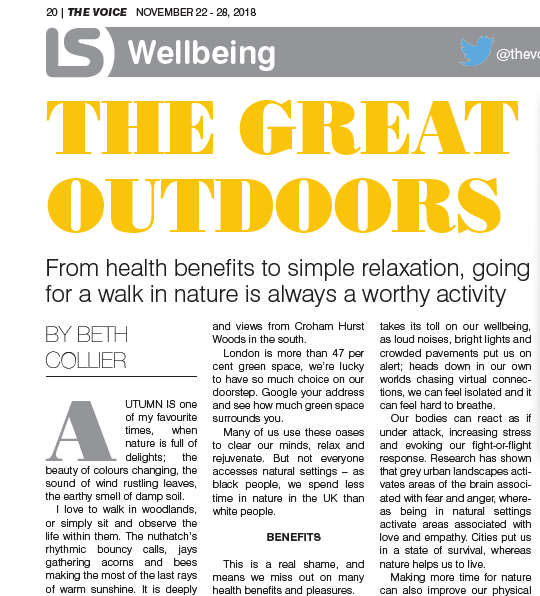
Sign up to learn more about our Nature Connectors programme
Nurture a closer relationship with the natural world and with others.
